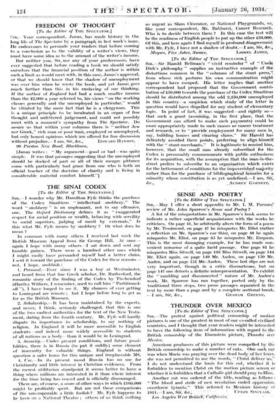THE SINAI CODEX
[To the Editor of THE SPECTATOR.] SIR,—I wonder why Mr. Hamilton Fyfe thinks the purchase of the Codex Sinaiticus " intellectual snobbery." The word " snobbery " is an unpleasant, not to say offensive, one. The Oxford Dictionary defines it as " exaggerated respect for social position or wealth, behaving with servility to social superiors, judging of merit by externals." Is this what Mr. Fyfe means by snobbery ? Or what does he mean ?
In common with many others I received last week the British Museum Appeal from Sir George Hill At once-- again I hope with many others—I sat down and sent my humble guinea. There were a hundred other uses which I might easily have persuaded myself had a better claim. 1 sent it toward the purchase of the Codex for these reasons— not, I hope, snobbish :
1. Personal.—Ever since I was a boy at Westminster, and heard from that fine Greek scholar, Dr. Rutherford, the romantic story of the finding of the Codex by Tischendorf (Hartley Withers, I remember, used to call him " Partitioned- off "), I have longed to see it. My chances of ever getting to Leningrad are remote ; but I hope 'before long to get as far as the British Museum.
2. Scholarship.—It has been maintained by the experts, and never, I think, seriously challenged, that this is one of-the two earliest authorities for the text of the New Testa- ment, dating front the fourth century. Mr. Fyfe will hardly dispute its importance to scholarship, to say. nothing of religion. In England it will be more accessible to English students—and indeed. more widely accessible to students of all nations as a body—than it would be in Leningrad.
3. Security.—Under present conditions, and future possi- bilities, there is in Russia (to put it mildly) sonic element of insecurity for valuable things. England is without question a safer home for this unique and irreplaceable MS.
Use.—In its present mood Russia has no use for Christianity and little interest in Christian evidences. From the merest utilitarian standpoint it seems better to .have thing where millions are interested in it than where interest for the time being has ceased and is officially discouraged.
There are, of course, a score of other ways in which £100,000 might be profitably spent. Thit are not, these- comparisons of the tmcomparablc a little foolish ? Mr. Fyfe happens to be keen on a National Theatre ; others of us think- nothing so urgent as-Shim Clearance, or National- Playgrounds, or, like your correspondent, Mr. Bakhnrst, Cancer Research. Who is to- decide between them ? In this case the test will be the readiness of English people to put up the other £50,000. Of this, and here again I find myself in profound-disagreement with Mr: Fide, I have not shadow of doubt.—I am, Sir, &c.,










































 Previous page
Previous page